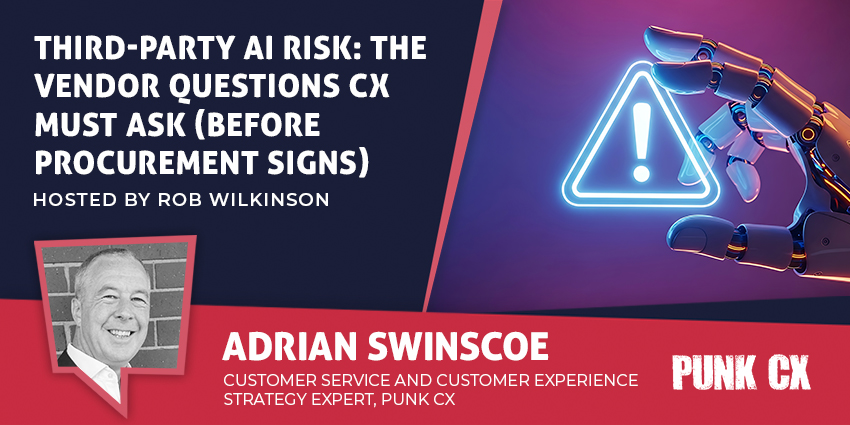Two major surveys have revealed that businesses across industries are still struggling to implement AI in CX due to the lack of preparation.
An IBM study has revealed that 62% of UK enterprises are unable to use AI’s full potential for successful adoption, with many employees having limited to no experience with the software.
A similar study conducted by Teradata also revealed that while almost all organizations have implemented AI in some form, only nine percent have fully advanced its place in the workforce.
These two surveys highlight detailed insights into why companies struggle when adopting AI tools.
Race for ROI – IBM
The IBM study highlights that AI reskilling knowledge and investment gaps are still underprioritized in the workforce.
In fact, 62% of organizations have still not managed to leverage AI to utilize full workplace transformation, despite having adopted the software.
Taken from 3,500 business leaders’ insights across EMEA, the study found that AI across UK industries is expanding productivity levels, with many leaders applauding the software’s efforts to free up employees’ creative and management schedules to allow focus on high-priority tasks.
And whilst IBM emphasizes AI’s growing position amongst the UK workforce, businesses often face barriers when adopting it, and in turn not receiving the amount of ROI benefits as expected.
But what are these barriers?
Inadequate Company Investment in AI Development
Employee preparation for AI deployment continues to create company shortfalls and stalls progress expectations after integration.
In fact, 67% of UK business leaders agree that there is an internal resistance amongst their workforce to activate pilot AI projects, with many reasons involving cultural restraints.
On top of that, just 45% of UK organizations offer a company-wide or function-focused AI training, with only 38% providing upskilling services for all its employees.
This highlights an important issue: AI can often be dismissed by companies due to a lack of knowledge on the software.
This leaves ROI results imperceptible for the majority of businesses, with only 27% of UK senior leaders seeing any cost returns or financial benefits from productivity in AI implementation.
Unable to Meet AI Trend Demands
Customer demand for the latest AI deployments across industries is forcing companies to look ahead of the newest trend curve or risk being left behind.
However, with rapid technological changes, keeping up with the latest trends requires continuous investment in pilot projects for companies that can spare the resources.
In September, a previous IBM UK consumer survey revealed that 74% of customers were happy with AI-powered assistants being involved in their consumer experience, with an expectation of transparency and trust with the automated agent.
This illustrates a future AI-focused approach to CX with rising customer trust, as 79% of customers believed that chatbots would deliver trustworthy results, as well as 72% showing satisfaction with using them.
Furthermore, the AI agents provide consumers with accelerated response times, resulting in customer convenience, which 40% of consumers valued, and demand for high levels of data protection and privacy for 37% of consumers.
It is clear from these results, that when deployed correctly, cutting-edge AI-powered solutions can deliver measurable CX improvements and help companies achieve ROI; however, smaller enterprises will likely struggle to meet these demands.
Key Constraints in AI Deployment
Additionally, companies have shown signs of significant challenges when it comes to measuring their ROI after adopting AI.
Notably, senior leaders surveyed in the study outlined the following as the biggest challenges to achieving ROI:
- High Upfront Investment Costs: 37% of leaders agreed that AI spending is too high for companies to measure their short-term ROI.
- Difficulty in Attribution: 35% of leaders found it difficult to measure performance outcomes from AI integration due to the number of factors contributing to its success.
- Lack of Skills or Knowledge: 31% of leaders acknowledged the gaps in knowledge and skill could be a barrier to accessing AI’s financial impact.
Companies must therefore assure that their AI investments are focused on its core business objectives to focus on efficiency, growth, and enhanced customer experience.
Not all Doom and Gloom
Despite the significant difficulties outlined above, the IBM study found that AI across UK industries is improving productivity levels, with 66% of senior leaders seeing high levels of productivity thanks to AI.
Indeeed, many leaders applauded the software’s efforts to free up employees’ creative and management schedules to allow focus on high-priority tasks.
This also includes 63% of leaders expressing higher efficiency rates across operations.
Leon Butler, Chief Executive of IBM UK and Ireland, highlighted the productivity benefits of company AI training investment, stating:
“UK businesses are clearly seeing the productivity benefits of AI, with two-thirds already reporting significant gains. But the real opportunity lies ahead – unlocking even greater value through workforce transformation and upskilling.
“By investing in AI skills training across all levels, organizations can not only outperform their peers but build a future-ready workforce that drives innovation and resilience.”
Sue Daley OBE, Director of Tech and Innovation at techUK, echoed Butler’s sentiments, emphasizing the requirements needed for businesses to use AI to its full potential:
“To succeed in the long-term, businesses must make AI reskilling a key part of their employee development strategy.
“This will empower employees to embrace and leverage AI’s potential, unlocking its full value across the whole business.”
The discussion around the importance of AI reskilling is particularly interesting following the recent layoffs at Accenture, where the company let go of 11,000 employees as part of a restructuring based on its reskilling strategy.
Speaking at the time, Accenture CEO, Julie Sweet, stated:
“We are investing in upskilling our reinventors, which is our primary strategy. Those we cannot reskill will be exited.”
Agentic AI Survey – Teradata
The Teradata study painted a similarly gloomy picture on the current state of AI in CX.
The report emphasized that despite agentic AI’s rate of adoption, many companies cannot access crucial data and display a lack of trust towards their governance structures to manage AI agents.
Implementation appears to be a top constrainer for many of Teradata’s enterprise respondents, despite 74% remaining hopeful in the AI’s ability to improve the CX space.
Taken from 500 established AI-relevant executives with more than 100 employees and $500MN in annual revenue, the survey reveals how the potential issue with AI adoption falls with company resources, rather than employees themselves.
For or Against CX Trends?
Trending agentic AI tool adoption remains mixed amongst enterprises, with over 50% of respondents eager to get their company established in the CX competition, more than a third remain cautious to wait for these trends to be proven reliable, up from 22% the previous year.
To avoid unnecessary AI ‘hype’ before committing, many companies prefer to wait for AI solutions to implement them.
This tactic, whilst beneficial from a financial perspective, can damage the overall speed rate of AI adoption if companies rely on one another to improve their capabilities.
Although 91% of surveyed companies have not yet fully adopted AI agents, 81% organizations that had were reporting soaring confidence levels in its ability to improve customer experience.
The conclusion? Confidence in AI adoption comes from implementing it to its full potential.
Data, Governance, and Skilling Conflicts
Obtaining data for AI in CX proves to be a demanding challenge for many enterprises, with only four percent having consistent and accurate data access on hand, with the 96% having experienced delays and inconsistencies.
Furthermore, when it comes to priority concerns, 34% agreed that data accuracy was a major issue, followed by 32% suggesting security was a crucial concern, meaning enterprises will need to aim for truth and safety when it comes to AI data handling.
In regard to governance, 93% reported challenges when creating frameworks and guardrails to manage AI.
This appeared to be an issue for larger organizations in particular: 42% of enterprises with more than $20BN annual revenue saw the biggest challenges when creating effective governance, implying a greater difficulty for implementing reliable AI when enterprises increase.
Similar to the IBM survey, gaps in knowledge and skills remain a key barrier to AI adoption across internal teams, with 73% not having the basic skills to advance AI initiatives.
AI Adoption Recommendations
While both reports offered insights and data on AI adoption struggles in the CX space, IBM also highlighted five recommendations to help combat these issues:
- Establish an effective operating model for AI: With a clear and consistent framework for AI transformation, companies can measure its business outcomes easily to drive ROI.
- Cultivate AI literacy and a culture of innovation, from the Board to entry-level: By educating all employees on how to use AI tools, staff can more effectively implement AI across most aspects of their workday.
- Get comfortable with uncertainty and rapid change: The AI environment is growing at an extraordinary rate, meaning companies will need to adapt to trends where possible, such as embedding tools and products into a variety of search engines, apps and devices and remain competitive.
- Understand the risks around AI deployment: As a newer technology, AI poses a number of risks towards enterprises, meaning AI governance should be deployed to handle and monitor daily threats such as data misuse or cyberattacks.
- Establish a cross company “AI Board” to mitigate risk: This is a dedicated oversight body that assesses risks before AI use cases are added, as well as identifying them as responsible and safe to use.
Both CX surveys have exposed the shortage of AI knowledge between organizations across their companies.
As noted in the IBM survey, companies do not always have the resources to accommodate their employees’ AI reskilling strategy.
However, money and company size may not always be the solution, as Teradata identified that even strong, established companies show visible restraint to AI implementation when it comes to governance.
One commonality, however, is that both have observed its respondents’ unwillingness to fully scale AI within a business, with AI execution on the backburner until deemed safe to implement.
Despite AI’s recent upsurge in popularity in the CX space, not all companies have yet built trust with the software, delaying the agents’ potential within a company.
Only once these issues are resolved will companies see better if any results from AI adoption.







